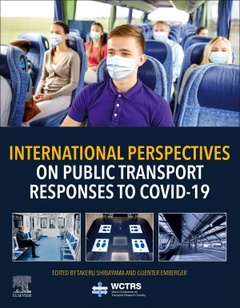International Perspectives on Public Transport Responses to COVID-19 World Conference on Transport Research Society Series
Coordonnateurs : Shibayama Takeru, Emberger Guenter

International Perspectives on Public Transport Responses to COVID-19 International Perspectives on Public Transport Responses to COVID-19 examines the pandemic response of transport policymakers around the world and analyzes what can be learned to prepare for the next epidemic?or any other critical event that threatens transportation services. It combines theoretical analysis with a compendium of country-focused case studies to provide scientific evidence and decision-making support for the actions that each transportation official must make going forward. This book begins with Part 1, a thematic and comparative section on response and recovery efforts. It provides insights into topics such as mitigation strategies and preparedness of the public transport sector to epidemics prior to COVID-19; responses during the COVID-19 pandemic and recovery from it; public transport services in urban and rural areas during the pandemic; and social (or physical) distancing and any other protective on-board measures. Part 2 then offers a set of international case studies, wherein various authors from different countries review their governments’ and operators' responses. Each chapter is guided by a set of common research questions based on disaster mitigation theory. Part 3 then focuses on learnings and comparative analysis from the COVID-19 pandemic for future epidemic mitigation strategies in the public transport sector. Governments, public transport authorities and operators, as well as students and researchers will learn what has and has not worked well during the COVID-19 pandemic. These insights will help them to mitigate, prepare, respond, and recover from unexpected disruptive events like pandemics in the future.
About the editors Preface Acknowledgments List of abbreviations Part 1: PT COVID-19 Response and Recovery 1. Introduction – Public transport response to COVID-19 from a disaster management perspective 2. Mitigation strategy and preparedness before COVID-19 3. The influence of public transport governance structures on COVID-19 operational responses and financing 4. PT COVID-19 responses of Informal public transport and DRT 5. Modal share of PT and COVID-19 Responses 6. Remote regions and COVID-19 restrictions caused transport impacts and responses 7. Psychological and behavioral changes in the early stages of the COVID-19 pandemic 8. non-pharmaceutical interventions on public transport 9. Long-term impacts in commuter travel demands 10. Long-term impacts in and adaptation of service provision: focus on PT in light of multimodal travels Part 2: Public Transportation COVID-19 Responses InternationallyPart 2.1 – Cities 11. Auckland 12. Tokyo 13. Taipei and Kaohsiung 14. Seoul 15. Beijing, Wuhang and cities in Guangdong 16. Berlin and Vienna Part 2.2 – Countries 17. Australia 18. Thailand 19. Turkey 20. Hungary 21. Croatia 22. Czech Republic 23. France 24. Italy 25. Belgium 26. United Kingdom 27. South Africa 28. United States Part 3: Conclusions and recommendations towards epidemic-resilient public transport 29. Build-back-better towards future resiliency and post-COVID public transport systems
Guenter Emberger started his research carrier in 1990 at TU Wien, Austria. Between 2002 and 2004, he was a Guest Research Fellow at the Institute for Transport Studies (ITS), University of Leeds, UK. Currently he is the Head of the Research Center for Transport Planning and Traffic Engineering (since 2017), Institute for Transportation, TU Wien. He is also chair of WCTRS SIG G2. He has expertise in travel demand behaviour analyses, design and implementation of 4-stage-transport models and strategic transport models on urban, regional and national levels, research in traffic safety and environmental impacts of car traffic, and public transport. He has been involved in more than 40 international and 60 national research projects. He has completed research stays in more than 10 non-European countries including Vietnam, China, Australia, and Japan. He contributed to over 140 scientific publications and gave more than 270 speeches and scientific presentations worldwide.
- Combines case studies (country-specific chapters) and analysis (thematic chapters) to enable a deeper understanding and provide different perspectives
- Puts a clear focus on public transport, the most affected mode of transport amid the COVID-19 pandemic
- Analyzes the COVID-19 responses in the public transport sector through the perspective of disaster management
Date de parution : 07-2024
Ouvrage de 280 p.
15x22.8 cm



